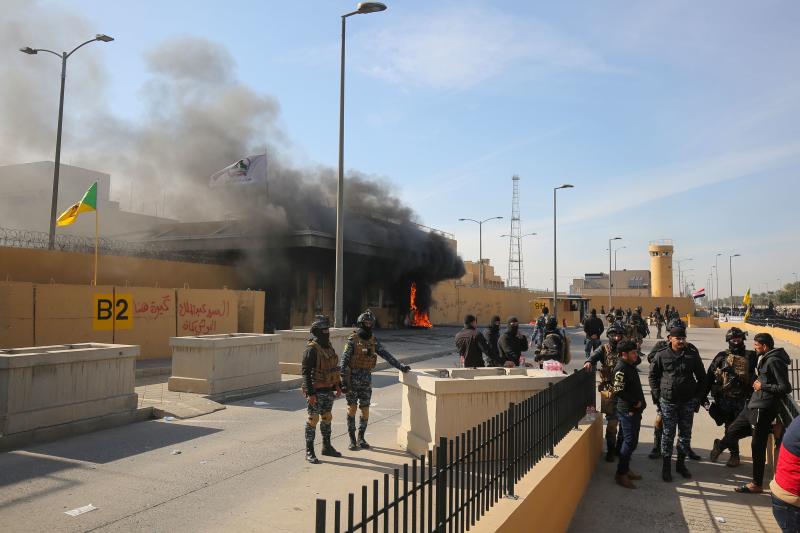The Asian Voice
Teheran could target US bases in Middle East: China Daily contributor
In the article, the writer says that by assassinating Iranian Major-General Qassem Soleimani, the United States has once again demonstrated its hegemonic behaviour.
Sign up now: Get insights on Asia's fast-moving developments

Iraqi security forces gather at the entrance of the US embassy in the Iraqi capital Baghdad on Jan 1, following a demonstration.
PHOTO: AFP
BEIJING (CHINA DAILY/ASIA NEWS NETWORK) - The assassination of Qassem Soleimani, commander of Iran's elite Revolutionary Guards Quds Force, is part of a much larger US strategy, which started during the Iraq war in 2003, to paralyse the command system of the "enemy" and render its military ineffective.
Although the two long-term foes are engaged in a war of words, and hopefully do not declare war on one another, the US attack has stirred up a hornet's nest.
For Teheran, it has vowed to avenge the killing of Soleimani.
In fact, Iran's resolve is reflected in the rising nationalist sentiments across Iran following the general's killing.
The widespread demonstrations against the Iranian government in protest against rising oil and commodity prices, for instance, have given way to large-scale anti-US rallies in Iran.
The US action appears to have united Iranians like never before.
The problem is Teheran has few bargaining chips. And it knows full well that it will bear the brunt if a war or large-scale confrontation breaks out, not least because Iran is surrounded by US military bases.
At best, Iran could target US facilities and military bases in the Middle East. Declaring a war against the US in the name of national pride is not an option for Iran.
Iran may target US forces overseas with the help of proxies, at the most. But this could lead to heightened vengeance from the US.
US President Donald Trump doesn't want a repeat of the hostage crisis in election year.
Yet, by assassinating the Iranian general, the US, as the only superpower, has once again demonstrated its hegemonic behaviour - that it does not need evidence to justify its actions no matter how unreasonable they are.
More important, the US president needed to make such a move to garner voters' support in the run-up to the presidential election in November.
After all, for American politicians, safeguarding US interests overseas and supporting Israel against Iran mean acquiring political capital in the form of the Jewish community's support.
This incident will roil the international oil market for some time mainly because of the threat to the shipping lanes in the Persian Gulf, through which 30 per cent of global oil exports pass.
The writer is the dean of the Institute for Studies on the Mediterranean Rim at Zhejiang International Studies University. China Daily is a member of The Straits Times media partner Asia News Network, an alliance of 24 news media organisations.


